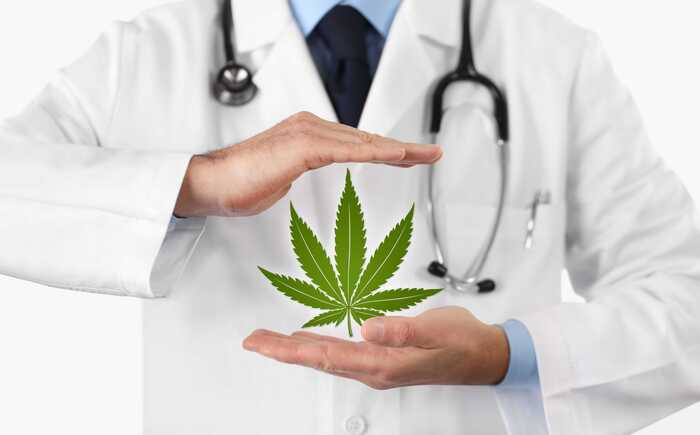The Benefits of THC
Updated September 11, 2024
The medical uses of CBD have already taken the country by storm. Products like lotion, lip balm, sleep aids, and mood enhancement edibles line shelves in gas stations and convenience stores everywhere. The success of CBD products has painted an entirely new image of how society views cannabis products and their users. As the stigma created by social anxiety around the substance vanishes, is it time to get the most out of the other popular compound found in marijuana known as THC? .
Anecdotal evidence about THC is abundant and has fueled research into many “miracle cure” claims. Those clinical trials have led to some surprising discoveries that promote the use of cannabinoids for medical and recreational use.

Why Does Medical Marijuana Work?
Medical marijuana has been successfully used to treat a growing number of medical ailments, from Alzheimer's disease to multiple sclerosis. It even has the potential to become a cure for cancer--research has already suggested cannabinoids may be able to kill cancer cells and slow tumor growth. But how does it provide these health benefits?
Cannabinoids
Cannabis plants contain more than 100 different chemicals known as cannabinoids. These chemicals interact with the human body's endocannabinoid system, which is what helps the brain regulate the nervous system's signals.
The cannabinoids in marijuana interact with the natural cannabinoid receptors in the body to affect the areas of the brain that control memory, concentration, thinking, movement, coordination, and sensory perception.
The two most commonly known cannabinoids in marijuana are tetrahydrocannabinol (THC) and cannabidiol (CBD). As previously stated, CBD is widely available. Its uses are centered mostly around pain relief and relaxation, and you can purchase it anywhere in the U.S. for around $10. THC, on the other hand, is still only legal based on state laws for recreational users and card-carrying patients. States in which recreational marijuana use is legal include California, Colorado, Massachusetts, Oregon, Nevada, and more.
What Symptoms Does Medical Marijuana Help?
Medical Marijuana is already being employed in therapeutic treatments for a surprising amount of ailments. In its early years, it was widely known to be used to treat glaucoma. As more states have legalized the substance, the research into its medical uses has expanded exponentially.
As this field of study expands, let’s take a look at what we already know:
Chronic Pain
Chronic pain is no fun. With symptoms like anxiety, fatigue, sleep deprivation, and persistent pain, people who experience chronic pain turn to all kinds of medication for relief. Now, medical cannabis offers a non-addictive option to ease the pain. Recent studies published under the NIH have shown that inhaled (smoked or vaporized) cannabis consistently reduces chronic non-cancerous pains.

Oral cannabinoids also have the potential to relieve certain types of chronic pain by improving patients' sleep cycles and overall quality of life.
Epilepsy
Medical marijuana has been found to treat epilepsy effectively as well. Both CBD and THC play a role in reducing epileptic seizures, though researchers are researching how and why they do so. While video evidence of epileptic seizures ceasing nearly immediately after applying topical CBD or THC is available online, such evidence is still considered anecdotal until it is reproduced under lab conditions.
Regardless, pure CBD extract products are currently being tested for treatment-resistant forms of epilepsy. While THC has been excluded thus far due to psychoactive effects, there are studies that show that a mixture with a heavy CBD to THC ratio is most effective in reducing seizures. The pharmaceutical world is placing its bets on marijuana.
Multiple Sclerosis
Those stricken with multiple sclerosis(MS) have also been using medical cannabis to help relieve their symptoms and facilitate restful sleep. An early study in 2018 suggests that along with pain relief, cannabis may improve muscle spasticity in MS patients. While THC may not be the cure for MS, it is a therapeutic option that greatly improves the quality of life for MS patients.
Crohn’s Disease
Out of all of the medical conditions THC helps ease, inflammatory bowel disease is a rather surprising one. It may achieve that effect since cannabis has properties that ease inflammation in the body. Crohn’s disease is a condition in which parts of the digestive tract become inflamed, hence the name inflammatory bowel disease. Naturally, the use of cannabis helps decrease the rate of these “flare-ups” due to its anti-inflammatory properties.
In one of the first studies of cannabis’ effect on Crohn's disease, researchers found that marijuana smokers were more likely to achieve clinical remission. When the study conducted a test using marijuana oil, the cannabis-infused oil scored better than the placebo in terms of quality of life and symptom severity. The success rate has been so high that doctors have been prescribing marijuana for Crohn’s Disease patients.
Glaucoma
Glaucoma has long been claimed to be treated by marijuana. However, medical doctors in the optical field are still wary of the stigma surrounding it. Regardless, studies ranging from the 1970s to present day reveal how cannabis reduces intraocular pressure by 30% when inhaled. Thanks to the vaso-relaxants in marijuana, cannabis increases blood flow to the eye, slowing the advance of glaucoma.
As more scientists and the public come to recognize these results regarding marijuana use and the plant's compounds, future applications for treatment in glaucoma are sure to come.
Is THC Bad For You?
THC has no negative health risks or effects that have been accurately researched and cited. Cannabis has a long history of slander thrown its way, from outlandish racist assumptions to an alleged association with the devil. There's no doubt that marijuana has had come a long way from back-alley deals to dispensary availability. As proponents work to eliminate the stigma surrounding it, cannabis is finally being researched and accredited by the scientific community for its medical benefits. Still, despite the health and wellness benefits of cannabis, you should keep in mind that nonprescription CBD products are not FDA-approved and may be inaccurately labeled.
While we wait for this tedious process to bear results, we can take note of what we know about the history of cannabis use. As far as we know, the effects a substance has on someone can often be used to identify what they have ingested. These behaviors are often recorded in police and medical records. While those records do not provide specific details, they do contain statistics regarding severe symptoms and death. THC has never been recorded as the direct cause of death from use or overuse.
Negative side effects from consuming an unhealthy amount of THC include paranoia, anxiety, dry mouth, and nausea. In addition, more minor side effects include hunger and thirst.
Delta 8 THC Benefits
Much of this cannabis literature is new, but Delta 8 THC research is even newer. Some has already surfaced showing Delta 8 THC can help increase neuroplasticity and cognitive functions, improve appetite, reduce inflammatory pain, eliminate nausea, and protect against tumors. If that wasn’t enough, it even helps lower anxiety and provides relief for patients with PTSD, depression, and bipolar disorder.
What is Delta 8?
Delta 8 THC is a minor cannabinoid found in marijuana plants and hemp. It is highly similar to Delta 9 THC, the compound responsible for marijuana’s euphoric high. In fact, Delta 9 can degrade into Delta 8 over time if stored properly. The major distinction is in a slight chemical variation that makes Delta 8 a less potent version of THC.
Its rise in popularity is largely due to the murky legality of chemical compounds related to marijuana, as well as the ease with which one can separate Delta 8 THC from hemp plants, marijuana’s fibrous cousin.

Is Delta 8 Legal?
Currently, Delta 8 is legal and sold openly on the market in states where marijuana is legal. Thanks to a 2018 farm bill, hemp can be grown and used for extractions. In some cases, this allows for it to be produced in states where THC is illegal. Since nearly all Delta 8 THC is extracted from hemp, it is federally legal and can be considered legal in all states that have no specific law prohibiting it.
Frequently Asked Questions
Even though you're surely equipped with some newfound knowledge of THC, there are always some gaps to fill. Let’s take a moment to answer some of the most frequently asked questions regarding THC.
THC content should be viewed differently based on your delivery method. Inhaled THC through smoke or vapor is measured by its percentage of THC content per 1/8 oz or 3.5 grams. When selecting flowers based on THC content, the best product for you is dependent on your personal taste. If you are looking to experience a quick high, selecting a product with at least 30% THC composition is key. If you're seeking a more mild experience, look for flowers with only 15% to 20% THC content.
Edibles' content is measured much differently. Ingested products use a condensed yet potent form of THC that affects the body differently than smoke in the lungs. The most common mistakes users make with edibles stem from eating products that are too potent. Beginners should start with a dose of 10 milligrams and work their way up to higher doses from there. Never mix edibles with alcohol or take them on an empty stomach.
While "best" is a relative term, the most bioavailable way to ingest THC is through edibles since they have a flawless 100% bioavailability rate. However, for some, munching on edibles all the time may not be healthy. The second-most bioavailable option is to ingest THC is through tinctures and oils such as cbd oil.
Interestingly, a non-psychoactive way to ingest a high amount of THC is by consuming raw cannabis. By grinding flowers into juices and smoothies, you can still enjoy the metabolic acids provided by THCA.
Tetrahydrocannabinol is the compound responsible for the psychoactive effects of marijuana flowers. It will most definitely get you high, but the effects of THC do have an upper limit that eventually makes the user drowsy. They also have mild effects from moderate exposure that produce euphoria, happiness, sedation, and hunger.
Be sure to identify the amount of THC content in your products before consuming them. Keeping track of how much you THC you consume is a healthy way to calculate a reasonable dose for your personal use.
Delta 8 is THC. Tetrahydrocannabinol may seem like a long name, but it's just the scientific version of the widely-used acronym. THC is commonly used to refer to delta-9-tetrahydrocannabinol. Delta-8-tetrahydrocannabinol is simply a slightly less potent cannabinoid found in marijuana that also happens to be in hemp plants.
To Recap
THC offers a variety of benefits and has a promising future. In fact, those ‘pot heads’ who claimed marijuana was the cure for cancer weren't entirely wrong. Cannabis really is a miracle plant with uses just waiting to be discovered by the curious minds of those willing to examine it.
We can’t wait to see what discoveries researchers will make in the coming years.